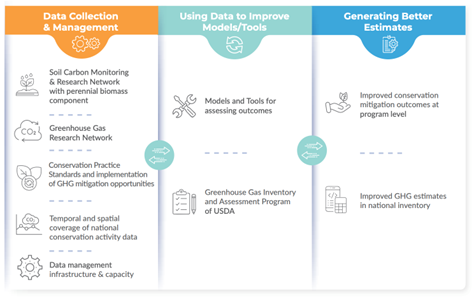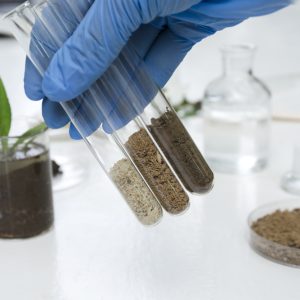Projects
Building Beta Data Management Protocols for Soil Carbon GHG Quantification
Sketching Out Systematic Approaches
The United States Department of Agriculture recently announced it will be investing $300 million over eight years in a GHG Quantification effort to improve data, models and tools needed for estimating the impact of conservation practices on GHG emissions and carbon sequestration. USDA has established seven collaborative work streams to help develop the effort.

Two USDA workstreams will be engaged in this event: the “Soil Carbon Monitoring and Research Network with an above-ground perennial biomass component” workstream led by Dr. Skye Wills, National Leader, Soil Science Research as well as the “Data Management Infrastructure & Capacity” workstream led by Laura Morton, Data Scientist, both with the National Soil Survey Center, USDA-Natural Resources Conservation Service.
To assist USDA in initial designs for their “Greenhouse Gas (GHG) Quantification Program,” Purdue Open Ag Technology and Systems Center (OATS) and Farm Foundation are hosting the Building Beta Data Management Protocols for Soil Carbon GHG Quantification virtual “event storming” will take place on October 24, 2023.
The “event storming” will sketch out a systematic approach that considers, among other elements:
- Agile and interactive processes
- Continuous improvement feedback loops
- External (beyond USDA) engagement with various groups and users
- Data interoperability
- Data access and privacy
- Data statutory compliance
- Published protocols and transparent documentation
Who Should Attend?
This event is best suited for experienced individuals who take part in soil data analytics, greenhouse gas modeling in agriculture, large data set management and data analytics architectures, interoperability of data systems related to soil and natural resources, and data sovereignty issues.
To help focus the event, the scope on October 24 will focus solely on soil carbon measurement and look to leverage existing data management tools such as COMET-Farm, DayCent, and the MODUS soil data standard.
The objective of the October 24th session is to develop a blueprint for a minimal viable beta set of protocols that can be rapidly co-developed in early 2024 through a virtual hackathon or “collabathon.” The people and entities involved in this event have a proven ability to rapidly hack tech solutions on this topic and are pleased to continue working together to support USDA’s efforts.
Registrants will be provided the option to take part as an active “participant” or a passive “observer.” We ask that “participants” take part in the entire event storming activity. The event storming will consist of an online Zoom event as well as the use of a Miro virtual whiteboard. You do not need prior experience with Miro to participate.
Participants will work on four themed focus areas: 1. Field Data Collection; 2. In the Soil Lab; 3. Feeding the Models; and 4. Meta Data Management.
Questions?
For more information please contact Rob Trice at rob@mixingbowlhub.com or Katie Grimble at katie@mixingbowlhub.com. Registration related questions can be directed to events@farmfoundation.org.
A Continuation of Collaborative Work on “Fixing the Soil Health Tech Stack”

In 2022, an assemblage of thought leaders came together and co-developed an “Eight Step Action Plan to Fix the Soil Health Tech Stack Now” that aligns with challenges the USDA faces in developing its approach to a GHG quantification effort. Participants included representatives from AgGateway, Colorado State University, Farm Foundation, Foundation for Food & Agriculture Research (FFAR), The Mixing Bowl, OpenTEAM, Point Blue Conservation Science, Purdue Open Ag Technology Center, Semios, Skidmore College & The Soil Inventory Project, Syngenta, the Soil Health Institute and TomKat Ranch.
Led by Purdue OATS, we held a virtual “Soil Data Hack” on a data set of over 1000 soil samples that had been collected and analyzed for total percent carbon by dry combustion at three separate analytical laboratories along with other soil data. Purdue OATS had put all of the data into the MODUS data standard to define data terminology, metadata and file transfer formats.
Within two days, the hackers took the MODUS-based soil data and turned it into a JSON format; fed the data into a business intelligence and data visualization system (Power BI); pulled it into OpenTEAM‘s open source FarmOS FMIS; leveraged FarmOS to associate soil data to GPS lat/long; used RDF (a World-Wide Web Consortium standard data description and exchange format) to put soil data on the blockchain and make it available for Regen Network’s carbon credit program; linked the MODUS data to any HTML browser for visualization; and used HTML to compare different soil data.
We are pleased to reconvene on October 24, 2023 to design a blueprint that we can build in 2024 towards advancing the data infrastructure necessary for the development of a national Soil Carbon Monitoring Network.
